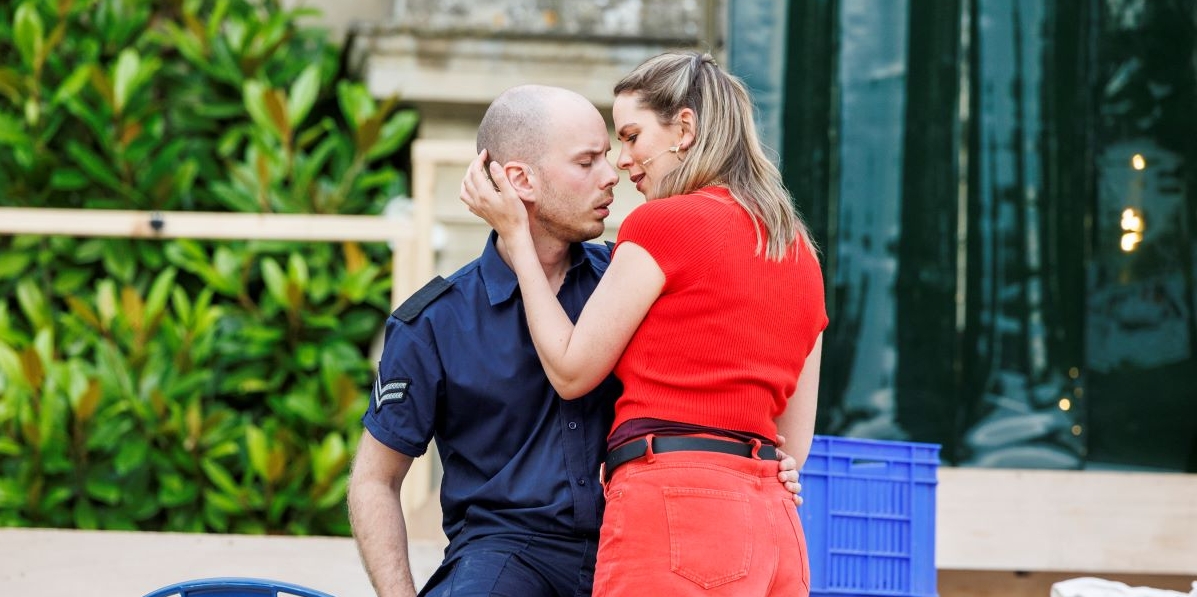Henry James used to say that you had to start with the given, and if you attend any of the performances at the new Waterperry Opera Festival, it is a given that you do not have to dress up, that there are wonderful formal gardens to explore beforehand and that you will enjoy the ambience and the entire experience, musically as well.
This year’s festival opened ambitiously with a production of Bizet’s Carmen. It was very well received by the audience and it was a provocative pleasure in many ways. Granted that you have to accept this is not a production that can do full justice to the usual spectacle of the work, the smaller forces on stage and in the orchestra pit caused a tight focus on the themes of this work. This intelligent production by Anna Morrissey considers the story of Carmen, her loves and the obsessive passion of Don José from a very contemporary viewpoint with a modern setting that involves a police force hunting the gang of criminals instead of a military force and funky outfits as well as drugs to consider. This approach focuses strongly on the darker, violent and more disturbing elements of the story.
This was a musically attractive rendition of the score, despite necessarily having reduced forces and the need for some amplification. Played outdoors on a wooden stage of more than one level, constructed using the Waterperry stately home as its backdrop, the playing of the small orchestra in no way diminished the tuneful aptness of this dramatic score but gave it some moments of unexpectedly searing clarity. Yes, some moments were cut so that, for instance, the changing of the guard and the children were missing, but that made Don José an even more brooding and disturbing presence as he emerged into the scene. I thought that he and Carmen were very well matched vocally and dramatically and were pretty sexy.
Above all the voices of the singers were extremely fine and pleasing. It was also a pleasure that everyone on the stage was so young and full of energy and commitment. I liked the way Morrissey directed the interpretations of each character dramatically. Vocally even the smallest role was interpreted with clarity and respect for the score. The movement and dancing during the production was compellingly choreographed by Emma Cole and Kev McCurdy directed the fights and other moments. The Don José of Xavier Hetherington was vocally beautiful and sensitive to the nuances of his character; his stage presence was strong. Catriona Hewitson as Micaela had a stunningly beautiful sound and the right mixture of innocence and spirit in her acting. Matthew Durkan was a fine Escamilla. Above all, Samantha Price was a convincing Carmen vocally and dramatically with a suitably alluring voice and presence. The ensembles such as the quintet in Act Two or the Card Scene in Act III were exemplary in their dramatic control, musical dynamics and harmonies and I very much liked the Frasquita of Ana Balestra and the Mércèdes of Elizabeth Lynch. The quintet with the Dancaire of Mark Nathan and the Remendado of David Horton was another highlight. I was also suitably impressed by Edmund Daon and Arthur Bruce as menacing Zuniga and Moralès.
For me the best moments in the evening were the intimate ones – Carmen convincing Don José to take off her handcuffs and let her escape in Act One; the beautifully controlled singing of the Flower Song in Act Two as well as Carmen’s seductive dancing. I was especially moved by the final scene of Don Jose’s pleading and Carmen’s taunting, the evening’s performance rising to the necessary powerful climax. It was dramatically and vocally powerful.
Scaled down or not, this was a performance to make you think about the actual work. I would love to hear all the voices again; and I would definitely like to hear Bertie Baigent conduct a Carmen with a full orchestra. I credit him with the meany beautiful and musically adept moments both orchestrally and vocally that seemed to me to bring out the intentions of the composer.

